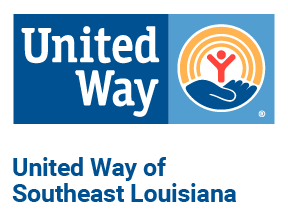Evergreen Life Services, a Northshore-based United Way of Southeast Louisiana Community Partner, provides a full range of services to people with intellectual and developmental disabilities, including community homes, day programs, and supported employment.
As Evergreen Executive Director Charmaine Jones put it on a recent episode of LIVE UNITED Radio, the nonprofit exists to empower and assist individuals with disabilities to live better lives and “be an active part of the community, not just someone who has always been behind closed doors.”
United Way’s funding helps Evergreen offset the cost of critical dental care support for clients that is not covered by Medicaid. Listen to Evergreen representatives Charmaine Jones (Executive Director), Connie Anderson (Donor Relations Director), Rev. Claire Brooks (Board Member), and Elizabeth Larose (Beneficiary) share more on why proper dental care is so important here, and read excerpts from the conversation below.
Elizabeth on how she became involved with Evergreen and the nonprofit’s impact on her family:
“My path started in 1985, through my parents…at that point in time, it wasn’t so easy (to find care). They tell the story of my sister, who is the joy of my life, and a wonderful human being, (she) has had her share of disability and mental challenges...My parents tell the story of being at wit's end and getting in the car and just driving to find someplace with care for her. There was a man at a gas station who stopped and said, “Can I help you?” He went and spoke to my sister for a few minutes and then he came back and gave them the telephone number and address for Evergreen Life Services.
“I have to thank Evergreen for not only caring for my sister but also because I would not have a life if they were not caring for her. My sister – the fulfillment that she feels, the love that she feels – I am very aware that the people who are with her day in and day out are as much her family as we are. There’s just nothing but gratitude…”
Charmaine on why Evergreen ensures clients get the same social experiences anyone else would:
“…We go out to eat, we go to the movies, we go to the beach…I know a lot of folks don’t understand how important that is, but about half of the folks who live in our 20 group homes lived in a state institution for the majority of their lives. So everything was brought to them. I’m not knocking the institution because it saved their lives, but they were kept from everyone else. And I think what that does is it stigmatizes folks, and it also tells the community that they are different. First and foremost, every person I work with at Evergreen is a person first – who happens to have a disability. That’s the part that I want to see throughout the community, that the community sees our folks as an individual first, who happens to have a disability….”
Connie on challenges and costs associated with providing dental care to individuals with disabilities:
“…One of the problems is when you have somebody that is that fragile – they are more prone towards movement (during procedures), they hear voices – there are some special things that have to be addressed before they can be cared for safely by a dental professional and their staff. So that means they have to get medication or have some type of anti-anxiety medication…So that is part of the cost…and as you said in your intro, Medicaid does not cover it."
“There are so many people who do have disabilities that don’t get this kind of care. And quite often what will happen is, if they do get it, the dental people will just pull all of their teeth. That’s not a great, healthy situation either.”
Claire on the impacts of inadequate dental care for individuals with disabilities:
“One of the things that really attracts me to Evergreen and that I’m particularly proud of is that our commitment is that our clients live the fullest life they possibly can…Think about how important your teeth are – if you’re in a position where you’re meeting the public, and your smile is mostly empty teeth, the response you get is, ‘What is wrong with this person’s mouth?’
“Just to be able to return a smile – and communication is so critical. We take, or grandma takes her dentures out, and no one can understand her. We need our teeth to communicate. And this is Louisiana! We like our food! To not be able to eat the things you want to eat because now most of your teeth are gone is horrible. So both in terms of what Evergreen is committed to and in terms what this United Way grant makes much easier for us to accomplish, is that dental care is key. We’re not talking about the occasional filling; we’re talking about something that is life-changing.”
Category
